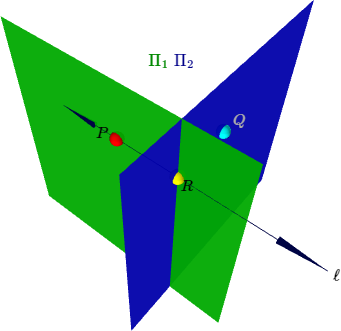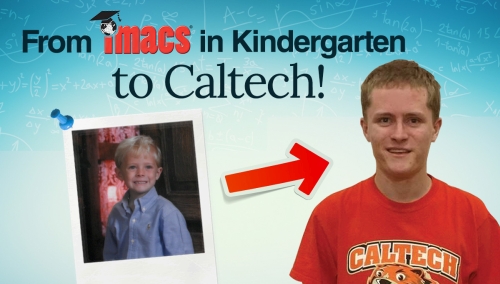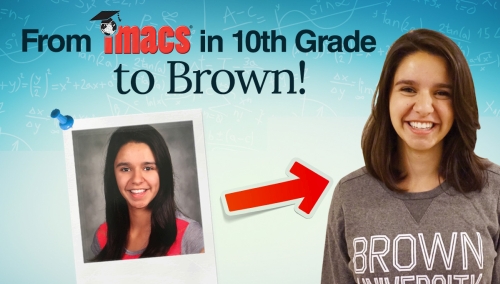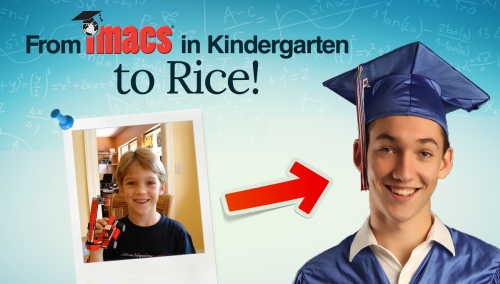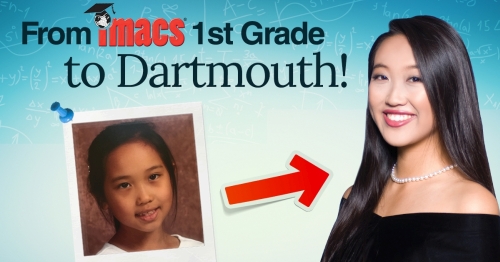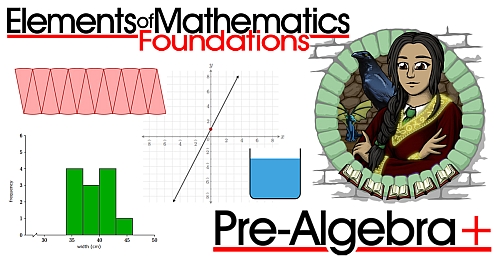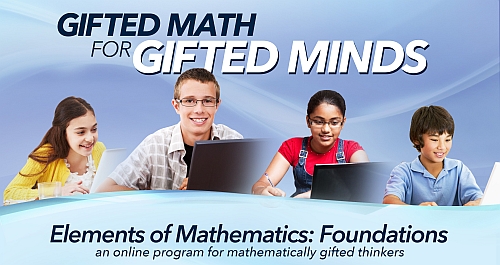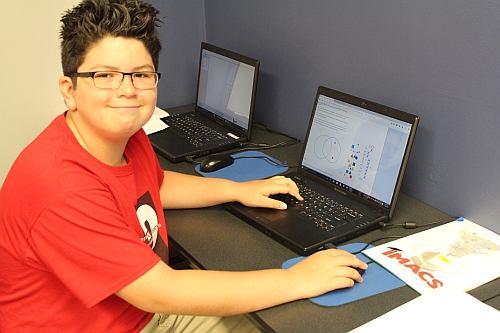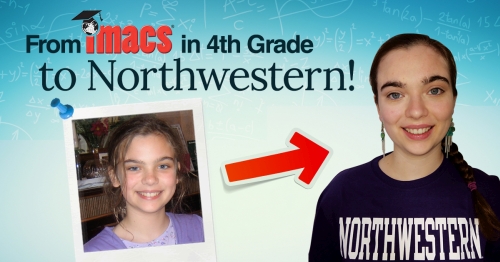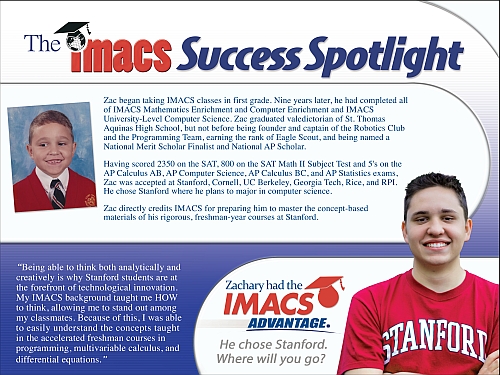
The following is an excerpt from Geometry: Incidence and Transformations, the first of three Geometry courses in the self-paced Elements of Mathematics: Foundations (EMF) series. EMF covers Pre-Algebra through Precalculus, plus several university-level topics, with the depth and sophisitication needed to challenge and mathematically talented children. Limited Time Offer: The first EMF course is available at 25% off regular tuition for students who enroll on or before October 31, 2017. Learn more at www.EMFmath.com.
In this course and the next our main focus is on Euclidean geometry. As you have undoubtedly noticed, in the preceding courses we have quite frequently talked about, considered, and even worked with a wide variety of geometrical concepts. But we have been relying on common knowledge and your intuitive understanding of such things; we have only rarely hinted at the formal underpinnings of this very important and pervasive area of mathematics.
The history of the study of geometry is very long and honorable, springing out of humanity’s attempts to describe mathematically the forms, shapes, and patterns seen in the real world.
Roughly speaking, our intended plan of study in this course is as follows: Each of us has a store of experiences with real objects, their forms, and their shapes. These experiences will be refined as we draw pictures of objects, observe specially constructed models of objects, and think about experiments that could be performed with these objects. As we sharpen our experiences with physical objects, we will describe corresponding geometric objects (such as points, lines, and planes), and decide what properties these geometric objects should have if they are to be mathematical replicas of the real objects. Of course, geometric objects, like all other mathematical objects, are abstractions, so the only role that can be played by our drawings and experiments with physical points, lines, and planes is that of serving as a guide to the properties that should be ascribed to their abstract geometric counterparts.
The properties we ascribe to the geometric objects will be called agreements. That is, we will agree to accept a certain property about geometric points and lines, say, because our experience strongly suggests that physical points and lines have that property. Of course, agreements in geometry, as in real life, have consequences. This then is the activity of geometry: to find out what the consequences of the basic agreements are.
In other words, we shall agree that the geometric objects we wish to study have certain basic properties. We shall then deduce that geometric objects with these properties must also have certain other properties. We will discover these new properties, not by looking at the objects (remember, geometric objects are abstractions!) but by thinking about them. We will express our thoughts in arguments of the following general form: Since we have accepted our basic agreements, then we must also accept that such and such is the case. But then we are constrained to accept that thus and so, etc. Finally we examine these new properties in order to decide whether they too are compatible with our experience of physical objects. In this way, Euclidean geometry becomes the mathematics of the shapes and forms of the world around us.
RJ was an IMACS student from kindergarten through 12th grade and took every class IMACS offered, including all levels of Math Enrichment, Computer Enrichment, Hi-Tech Summer Camp, University-Level Computer Science, AP Computer Science: Java Programming, and University-Level Logic for Mathematics.
With a 5.9 GPA and 2360 on the SAT, RJ graduated as co-valedictorian and was honored as a US Presidential Scholar candidate, National AP Scholar and National Merit Scholar. He and his teammates were also four-time Science Olympiad state champions.
RJ was accepted to Caltech, Georgia Tech, Carnegie Mellon, and the University of Florida. He chose Caltech where he took junior-level Computer Science classes as a freshman and served as a Teaching Assistant for those classes as a sophomore. RJ conducted summer research in computer vision and was selected for an internship at Northrup Grumman. He will graduate with a double major in Computer Science and Philosophy and plans to attend graduate school to specialize in Machine Learning.
“IMACS taught me an organic approach to problem-solving, a way of thinking that demonstrates the necessary rigor required to solve genuinely challenging problems. The introduction to proofs and logic that I got at IMACS was absolutely critical to my success at Caltech.”
Congratulations, RJ!
RJ Antonello
Cori wanted to understand the fundamental concepts that make up the sophisticated theories of Computer Science. She started IMACS during the summer before tenth grade and went on to complete IMACS’ University Computer Science track and AP Computer Science: Java Programming course. Cori scored a 5 on the AP Computer Science A exam, 800 on the math portion of the SAT, and was named a National Merit Scholarship Finalist.
Cori’s keen interest in using her knowledge to understand real-world problems inspired her to write a Naive Bayes machine learning algorithm to detect political bias in online news articles. Her paper on it was selected for presentation at the Georgetown Junior Science and Humanities Symposium, and she was honored as an affiliate winner for the National Center for Women and Information Technology’s Aspirations Award.
Cori chose Brown University where she was accepted early decision and plans to study Computer Science and Economics. She hopes to pursue a career applying data science within education or a service-based field.
“IMACS turned the slightly enigmatic, ever-changing field of Computer Science into a never-ending set of fun puzzles for me to solve. It brought to my attention the intricacy and beauty of the field while illustrating how I could become a part of it.”
Congratulations, Cori!
As a young child, Mason excelled in IMACS Math Enrichment classes and, in subsequent years, attended several weeks of IMACS summer camps. He later completed IMACS’ university-level courses in Computer Science and Logic for Mathematics. Mason was honored by the College Board’s National Hispanic Recognition Program for his achievement on the PSAT/NMSQT, and his high school mathematical modeling team was recognized by the Consortium for Mathematics and its Applications. Mason graduated high school with a perfect 4.0 GPA and 34 on the ACT.
A natural at sharing knowledge, Mason enjoys tutoring students in science and math at a local homeschool co-op, co-taught a robotics class for two years, and was a Teaching Assistant for an Honors Calculus seminar. He accomplished this and more while being an all-county varsity and travel soccer player and a dual-enrolled student at a regional 4-year university.
Mason chose Rice University where, at 16 years old, he was accepted early decision into the George R. Brown School of Engineering. He plans to major in Materials Science and NanoEngineering.
“My early exposure to IMACS provided me with a unique foundation in logic and mathematics that helped me succeed in advanced STEM classes at a very early age. I understand numbers intuitively and am able to solve complex problems in my head thanks to my IMACS training.”
Congratulations, Mason!
Snow began IMACS in 1st grade and completed all levels of IMACS Math Enrichment. She returned during high school to complete the IMACS University Computer Science track. Snow’s talents and keen interest in programming, civics, and service propelled her to 1st place finishes at FIU’s Google Startup Competition, Ft. Lauderdale’s Code for America Civic Hackathon, JusticeHack Miami, and Yale’s Bulldog Invitational Mock Trial Competition.
In addition to being selected as a National Merit Finalist, Snow was named Cadet of the Year by the Florida Wing of the Civil Air Patrol and won 1st Place at the National Cadet Special Acts Competition. Snow credits IMACS for the way she thinks and approaches every aspect of her life.
With a 5.5 GPA, 1580 out of 1600 on the SAT, and 800 on the SAT Math II exam, Snow was accepted at Dartmouth, UC Berkeley, NYU, Vanderbilt, Wellesley, and the University of Miami. She chose Dartmouth where she plans to double major in Computer Science and Economics and eventually pursue a career in cyberlaw or cybersecurity.
“IMACS is the one place that doesn’t teach you steps to get to a specific solution but rather how to use logical and creative thinking to develop your own solution. It is the embodiment of everything learning should be.”
Congratulations, Snow!
This month's IMACS blog post is by guest author and eIMACS student, Naomi Spargo. Naomi recently sent us the following letter and kindly agreed to let us share it with our blog readers. Learn more about the eIMACS online courses that helped Naomi develop a passion for math and computer science and be prepared for a summer program in Artificial Intelligence at Stanford.
Dear IMACS,
I recently got back from the Stanford Pre-Collegiate Summer Institutes program and wanted to let you know that it was absolutely amazing! It was very intense, but I also learned a ton. I learned about all the different techniques that fall under the umbrella of artificial intelligence such as machine learning, neural networks, and search algorithms. (I found the search algorithms that I learned in eIMACS very helpful.) I also learned answer set programming, which had a very steep learning curve for most of the class because they had never encountered formal logic before. I was at a big advantage because of the logic classes I took with eIMACS.
Other than a more sophisticated approach to coding, what I took away from Stanford was a better understanding of how sprawling of a field computer science is. I've always approached coding in a very mathematical manner because mathematics has always been my strongest area of expertise. At this camp, I encountered many other coders that aren't particularly strong in math but have a heavy background in something else, like robotics.
The way we approach problems is extremely different. Depending on the problem, my approach works much better than theirs or vice versa. There are so many different fields within computer science; each field lends itself to a different type of mind. I now see the need to specialize within computer science, perhaps on data analysis or cybersecurity (both math-heavy fields).
I also wanted to take this opportunity to thank you for making advanced coursework available and enjoyable for young people like me. Your courses have been a godsend in three primary areas:
1. They helped me develop a passion for math/computers.
I had a strong dislike for math classes before I took your courses because the way math is taught in schools is very dull. My biggest frustration with school math classes was how shallow the content was; we were essentially being taught to memorize symbols. Only occasionally were we offered a real understanding as to how the symbols connected. I hungered for deeper meaning in mathematics, and was doing my best to figure it out myself.
The only math I enjoyed was the work I did myself with a store-bought textbook and a calculator. I didn't associate the math I did with any structured "class" because every class I had taken was slow, boring, and surface level. I was excited to learn, but my approach to learning was unorganized and inefficient. There is only so much an eleven year old can do on their own.
eIMACS was a huge assist in this. Your courses explain everything in approachable language so I was not intimidated away as a young child, but gave me the deep understanding that I wanted. The content is presented in an interesting manner. The material was clearly written by someone who loves what they are doing, and the instructors who helped me with my questions share this attitude. This passion translated to me; I no longer felt alone when it came to my love of math. eIMACS courses pull off a rare trick in education; they explain complicated ideas to 11 year olds without sacrificing complexity. Your courses are comprehensive; you leave no questions unanswered. I enjoyed them more than anything I have taken in high school.
2. They gave me a competitive edge in nearly every subject.
It is self evident that the three computer science courses I took with you helped me with coding. The diversity of languages you offer is a huge benefit, because certain languages lend themselves to certain problems. At Stanford, the AI class teamed up with the cryptology class to crack some numerical-based codes. Haskell, which I knew thanks to you, particularly lends itself to interpreting numerical data, so I could crack the codes much faster than students who were confined to object-oriented languages like Java. You also gave me experience with complex data structures, which most coders my age have not encountered.
Similarly, the logic I have taken with eIMACS helped me with math. I often reference my tautology template when proving theorems. It gives me an organized way to express my theories and postulates. I see logic as a honing device for mathematical thought. However, the reach of these courses goes far beyond math and science. My English essays (especially the persuasive ones) often employ tautologies written out in prose form. Logic has made my writing more coherent and streamlined; it has improved my word economy because I can organize my thoughts more efficiently.
My strong foundation in logic has also made me a more persuasive speaker. I do a form of debate called extemporaneous speaking, where I have thirty minutes to prepare a seven minute persuasive speech about a current political topic. Because my time allotment is so small, I need to break down complicated economic and political concepts quickly so that the average person can understand them. Using rules of logic is an excellent way to do this. My debate coach has told me I have "logos for days"; I directly attribute this to my eIMACS courses.
3. They allowed me to specialize on what I truly loved earlier than most students.
eIMACS courses are so much more advanced than what most high schoolers are exposed to. I know much more about the fields I'm passionate about and can specialize sooner as a result. Most kids my age have no idea what they want to major in. Because of IMACS, this is not the case for me.
I feel very fortunate to have taken eIMACS courses and am thankful to all my IMACS instructors for inspiring and encouraging me. I know that my eIMACS background has prepared me well for college and whatever I decide to do after, and I feel confident that the way of thinking logically that I learned in eIMACS will help me face any challenge.
Sincerely,
Naomi Spargo
A typical pre-algebra curriculum is designed to promote computational or procedural fluency. Unfortunately, that is rarely enough to engage gifted minds. Pre-Algebra Plus, an online course within the Elements of Mathematics: Foundations program, offers gifted students a better option.
Five Reasons Gifted Students Prefer Pre-Algebra Plus
- Pre-Algebra Plus was created specifically for the way gifted minds work. Course material invites students to play with numbers, patterns, and puzzles. Unnecessary repetition is traded away for deep exploration of complex ideas. This approach appeals to both traditionally "mathy" kids and those with untapped mathematical talent.
- Instead of telling students what the rules are, Pre-Algebra Plus takes students on the journey of discovering the rules through observation, conjecture, and reasoning. As one parent put it, Pre-Algebra Plus teaches math from the inside out.
- Pre-Algebra Plus introduces basic logic and proof techniques. Logic and creativity complement each other naturally in the study of genuine mathematics. Creative thinking helps students leverage what they know and observe into new (to them) ideas about mathematical concepts. Logical thinking helps order and cement those ideas into cohesive arguments and conclusions.
- Pre-Algebra Plus is hard! The course explores several university-level topics not normally studied until college. For a mathematically talented child, being challenged is a joy. After all, what's the point of a Formula One racecar if you only get to drive it on a straightaway, even at accelerated speeds?
- Pre-Algebra Plus is individually-paced and available online 24/7, allowing each student to work on the course when convenient and go at the pace that works best for his or her learning.
Is your mathematically talented child ready for pre-algebra? Does he or she need a flexible, online course designed for the gifted thinkers? Pre-Algebra Plus is that course. Visit the Pre-Algebra Plus website to learn more about course content and enrollment.
Special Offer: Pre-Algebra Plus is offered to new students at a 33% discount to regular price. Visit www.EMFmath.com for details.
Acceleration Helps But Gifted Kids Need More
For mathematically talented children, acceleration is a commonly used approach to address their need to be challenged. While acceleration can save gifted math students from unnecessary repetition, by definition acceleration cannot go deeper than the standard curriculum, and deeper is what many of these students desperately need. Mathematically talented students deserve to be inspired by engaging curriculum, not merely less bored. Educators know this and are seeking better solutions that offer gifted math students the opportunity to study genuine mathematics with the depth and sophistication that match how their gifted minds work.
Common Characteristics of Gifted Children
The National Association for Gifted Children (NAGC) lists common characteristics of gifted children. Twelve that relate particularly to the study of mathematics are:
- Rapid learner; puts thoughts together quickly *
- Excellent memory *
- Advanced comprehension of abstract ideas
- Enjoys solving problems, especially with numbers and puzzles
- Thinking is abstract, complex, logical, and insightful
- Longer attention span and intense concentration
- Learn basic skills quickly and with little practice *
- Asks probing questions
- Highly developed curiosity
- Interest in experimenting and doing things differently
- Puts idea or things together that are not typical
- Vivid imaginations
Of these twelve characteristics, acceleration can make maximum use out of only 1, 2 and 7 to deliver a learning experience that is somewhat better than no accommodation at all. The other nine characteristics require an approach that is fundamentally different from the standard curriculum, which is designed to work with typical students.
EMF Understands Gifted Thinkers
Elements of Mathematics: Foundations (EMF) provides that fundamentally different approach. Developed by a team of mathematicians who teach gifted children, EMF was designed from scratch to leverage all 12 characteristics. The result is a curriculum that allows talented students to immerse themselves in the study of mathematics where their unique way of thinking fits naturally and is an enormous advantage to learning at the highest levels.
One of the most important aspects of EMF is that it allows students to experience the excitement and satisfaction of intellectual discovery. The standard curriculum, accelerated or not, tends to present the final result as a given to be accepted blindly. By contrast EMF emphasizes the path leading up to the result and teaches some basic techniques of logic used to get there.
EMF students are guided through thought-provoking exercises that lead them to keen observations. Then using logical and creative thinking to analyze and synthesize this information, students are able to arrive at the result themselves. This approach creates a much deeper, intuitive understanding of mathematics and is strongly aligned with how gifted children learn, especially the nine characteristics that acceleration ignores.
Gifted Math 2.0
Acceleration has been an acceptable compromise solution for gifted math students and their educators for a long time. Many gifted students, however, have long needed and deserve better. They need to learn mathematics in a way that embraces their endless curiosity and unique way of looking at the world. They need a curriculum designed specifically for the way their minds work. That curriculum is EMF.
IMACS Staff Writer @ 1:00 am
beginning her studies at Northwestern University.
Fiona first attended IMACS Hi-Tech Summer Camp when she was ten. Over the next eight years, she went on to complete IMACS’ university-level courses in University Computer Science, AP Computer Science: Java Programming, and Logic for Mathematics. Homeschooled since fifth grade, Fiona was awarded a National Merit Scholarship, named an AP Scholar with Distinction, and scored 2360 on the SAT. She is also a second degree black belt in Taekwondo and won a bronze medal at the 2013 AAU Junior Olympic Games.
As a high school student, Fiona studied four years of undergraduate, advanced undergraduate, and graduate classes in mathematics and physics at Northwestern University where she is the only student to have won the Outstanding Achievement in Advanced Mathematics Classes by a High School Student prize four years in a row. During that time, Fiona also served as a Teaching Assistant for the University of Chicago’s Young Scholars Program, a position usually reserved for undergraduates.
Fiona chose Northwestern, where she intends to major in Mathematics and Physics. She plans to pursue a career as a university professor of mathematics. Fiona directly credits IMACS for helping her to develop a deeper appreciation for and a sense of ownership of the mathematics that she learns.
“Logic and computer programming classes at IMACS taught me how to organize my thinking and break problems into solvable pieces. The natural structure of logic and computer programming allowed me to see the structure of a mathematical proof as I was writing or reading it. When I understand it at that level, I feel I can reconstruct it and use it creatively as well.”
who is beginning his sophomore year at Stanford.
Zac began taking IMACS classes in first grade. Nine years later, he had completed all of IMACS Mathematics Enrichment and Computer Enrichment and IMACS University-Level Computer Science. Zac graduated valedictorian of St. Thomas Aquinas High School, but not before being founder and captain of the Robotics Club and the Programming Team, earning the rank of Eagle Scout, and being named a National Merit Scholar Finalist and National AP Scholar.
Having scored 2350 on the SAT, 800 on the SAT Math II Subject Test and 5’s on the AP Calculus AB, AP Computer Science, AP Calculus BC, and AP Statistics exams, Zac was accepted at Stanford, Cornell, UC Berkeley, Georgia Tech, Rice, and RPI. He chose Stanford where he plans to major in computer science.
Zac directly credits IMACS for preparing him to master the concept-based materials of his rigorous, freshman-year courses at Stanford.
“Being able to think both analytically and creatively is why Stanford students are at the forefront of technological innovation. My IMACS background taught me HOW to think, allowing me to stand out among my classmates. Because of this, I was able to easily understand the concepts taught in the accelerated freshman courses in programming, multivariable calculus, and differential equations.”
« Newer Posts — Older Posts »








